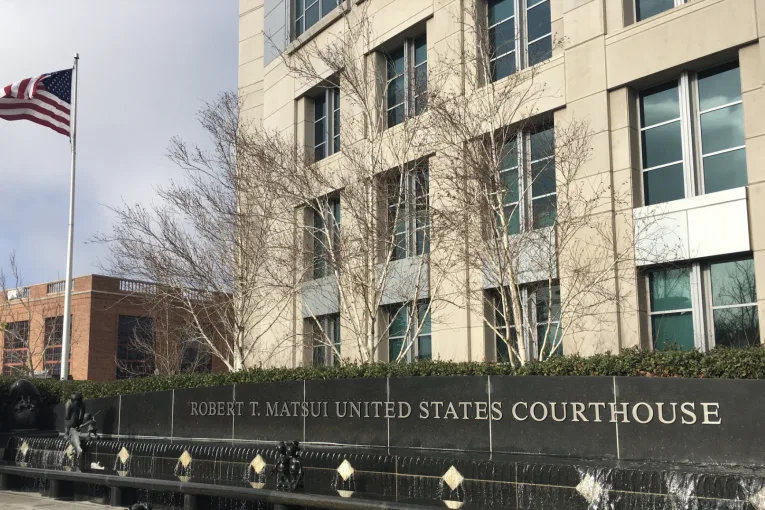
SACRAMENTO, CA – Federal Judge John A. Mendez presided over a pre-trial conference Friday morning at the Robert T. Matsui Courthouse here in a civil rights suit involving racial justice protesters at the 2020 and 2021 George Floyd protests, despite the “warfare” alleged against them by the Sacramento Police Department.
The Davis Vanguard covered the case in a previous article, where Senior Staff Attorney at Lawyers’ Committee for Civil Rights of the San Francisco Bay Area, Marissa Hatton, stated, “The Court has found that the warfare waged by the Sacramento Police Department against racial justice protestors, including through its unfettered use of chemical weapons and kinetic impact munitions…must be scrutinized by a jury. We look forward to holding the City of Sacramento accountable at trial.”
Judge Mendez began court by going over pre-trial conference orders in preparation for a trial set to begin in March.
A Second Amendment complaint was filed by the Plaintiff against the Sacramento Police Department, the City of Sacramento, and Daniel Hahn on July 11, 2022.
The complaint stipulates, “This lawsuit seeks compensatory relief for severe injuries that Plaintiffs endured at the hands of the Sacramento police, and injunctive relief to stop the City of Sacramento and its Police Department from continuing to employ discriminatory, violent tactics against protesters.”
The Second Amendment complaint summarizes the events of 46 year old George Floyd’s murder and the protests against police violence that occurred around the world. Focusing in on the protest in Sacramento, the Second Amendment complaint details how the plaintiffs’ Constitutional right to assemble and protest were violated by the Sacramento Police Department.
As a result, the Second Amendment complaint states, “Plaintiffs have also suffered physical, psychological and emotional harm arising from the excessive force and discrimination of Defendants.”
The Second Amendment complaint charges the “Sacramento Police Department has allowed persons aligned with white supremacist and organized hate groups (including the Proud Boys) to demonstrate unhindered and unharmed.”
The Second Amendment complaint explains that the Sacramento Police Department’s policies are not only “discriminatory, racist, and inhumane” but violate the First Amendment, the Fourth Amendment, the Fourteenth Amendment “and the protections secured by the California Constitution and other state laws.
“Defendants should be enjoined from further violations of Plaintiffs’ constitutional rights and be ordered to compensate Plaintiffs for their injuries.”
Friday morning, in court representing the Plaintiffs, stood Civil Rights Attorneys Emily Rose Johns, Dan Siegel, Cynthia Rice, Marissa Hatton and Andrew Ntim from Siegel, Yee, Brunner & Mehta.
Standing for the Sacramento Police Department was Senior Deputy City Attorney Sean Richmond and Attorney Scott Thorne.
Judge Mendez asked why there were six plaintiffs listed and only four were seeking monetary damages.
Civil Rights Attorney Johns responded four of the plaintiffs were seeking monetary damages for physical injuries while the other two were for emotional and personal injuries, adding, “You don’t have to have physical injury to be assaulted or battered.”
Johns wanted to make the records clear they would be proceeding with the case under Monell. To which Judge Mendez agreed and replied, “All my records are clear.”
The 1978 Supreme Court Case Monell v. Department of Social Services of the City of New York established the possibility to hold “local governments and government agencies liable for officer misconduct under 42 U.S. Code § 1983,” according to Jenner Law.
Judge Mendez made it clear to the court that if a witness was not listed in the pre-trial order they would not be able to testify and same ruling applied for exhibits, noting, “I think I counted over 500 exhibits for the defense” and if an exhibit is not listed “it will be difficult to meet the good cause standard.”
Civil Rights Attorney Siegel asked “if the parties had not agreed to an exhibit would the court entertain that in the opening?”
Judge Mendez replied no, then asked Attorney Thorne if they would be using all of the body cam footage, and Thorne stated they did not intend to use all.
Judge Mendez reviewed guidelines for witnesses, noting 250 total witnesses, and reminding parties to be aware of duplicate witnesses.
“I don’t need 10 witnesses to tell me the same thing three witnesses did,” asserted Judge Mendez as he asked those in court to look over the witness list.
Additionally, Judge Mendez asked the parties to have a witness list prepared to give to the jurors in order for them to identify if they recognized any names on the list in order to “make things easier.”
Judge Mendez then went over scheduling for the case to which Civil Rights Attorney Johns commented that 14 days with six plaintiffs was “a little ambitious” and stated the case would probably need 20 days.
Judge Mendez noted the case for 20 to 25 court days commencing March 10 for a preliminary hearing, and trial to commence the week of March 17.